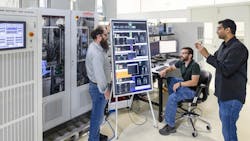DOE Kicks Off Technical Collaboration Program for Electric Grid Research
The Department of Energy’s Oak Ridge National Laboratory has introduced a new technical collaboration program to help businesses develop and launch electric grid innovations.
The initiative, sponsored by the Transformer Resilience and Advanced Components program in DOE’s Office of Electricity, will provide companies access to national laboratory resources and also help them to capture market opportunities.
Startup and small businesses are allowed to submit specific proposals for cost-shared research in ORNL’s Grid Research Integration and Deployment Center, or GRID-C located at ORNL’s Hardin Valley campus in Knoxville, Tennessee. The facility is uniquely positioned to protect and develop technologies from the smallest power module to transmission-level architectures.
The GRID-C technical collaboration program will provide access to many labs and test beds for research in power and energy systems, vehicle and buildings science, power electronics, energy storage, sensors and controls, data science, modeling, and cybersecurity. Related facilities on ORNL’s nearby main campus also provide a platform to develop and test new conductor and transmission technologies.
The technical collaboration program is accessible to partners with varying levels of resources and for seed projects with a tightly targeted research scope. ORNL offers expertise in design, development, prototyping and evaluation of grid hardware, software, architecture and modeling.
The technical collaborations will help businesses reduce the commercial risk of producing or adopting new energy efficiency technologies, simulation methods and other advances. The innovations will provide broader public benefits, such as improving domestic supply chains, growing technical proficiency within the energy industry and expanding employment opportunities.
Companies eligible to participate in the GRID-C collaboration program must have or develop a focus on advanced components and power stages, advanced converter systems or resource integration and management systems for commercial applications in the U.S.
